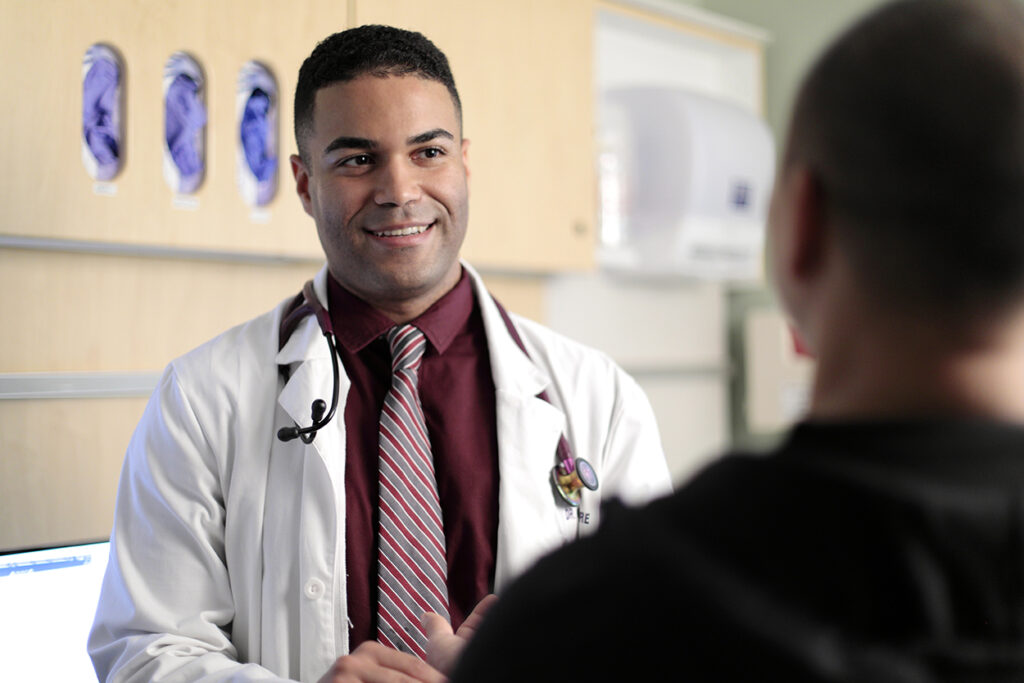News
After Wright Center residency, this physician ready for the long haul

Dr. Kevin Beltré realized that primary care was the perfect career choice for him while completing a Regional Family Medicine Residency at The Wright Center for Graduate Medical Education in Scranton. The former Philadelphia resident intends to stay and work in the area after graduation, delivering high-quality health care to Northeast Pennsylvania residents.
Dr. Beltré foresees career longevity in family medicine – and finds spot in NEPA
Rather than aim to retire at the earliest opportunity, Dr. Kevin Beltré plans to stay in medicine for the long run and be “one of those doctors working well into their 70s.”
“My professional goal is to keep practicing medicine and serving the patients and community as long as I possibly can,” says Beltré, 32, who is on track to soon complete The Wright Center for Graduate Medical Education’s Regional Family Medicine Residency.
To lessen the likelihood of career burnout, the physician already made one bold decision: He switched a few years ago from an emergency medicine focus, which he realized wasn’t the right fit for him, to the family medicine field, where he found his niche and an urge to make primary health care a lifetime pursuit. Recently the former Philadelphia resident made another significant life choice, one which demonstrates his commitment to his profession and to Northeast Pennsylvania.
He signed an employment contract with the Lehigh Valley Health Network that will keep him actively treating children and adults in the heart of Lackawanna County – where he attended medical school and where he is set to finish The Wright Center’s residency in December.
He expects to begin the job in early March 2023 at offices near the newly opened Lehigh Valley Hospital-Dickson City. For Beltré, it will be a major personal milestone. “I just can’t wait to be there March 6 as an attending physician,” he says.
For The Wright Center, it will signify that its mission is being met – and the organization’s still-unfolding success story continues to be written.
From its start in 1976, The Wright Center for Graduate Medical Education has been committed to generating a steady stream of competent, compassionate and community-minded physicians to help keep pace with rising patient demand and address persistent shortages of health care professionals in the region and across the United States.
Early proponents of the Scranton-based physician training program were especially interested in developing doctors who would choose to practice locally. These community leaders, including namesake founder Dr. Robert Wright, foresaw the coming challenge in filling the slots of retiring physicians and tending to the ever-broadening health care needs of an aging population. They launched an internal medicine residency, whose initial class consisted of six trainees.
In the more than 45 years since then, The Wright Center for Graduate Medical Education has grown in size and scope to reflect the community’s and the country’s evolving needs, now training about 250 residents and fellows each academic year.
Today, The Wright Center is proud to be the largest U.S. Health Resources and Services Administration-funded Teaching Health Center Graduate Medical Education consortium in the nation. It offers residencies in four disciplines – family medicine, internal medicine, physical medicine & rehabilitation, and psychiatry – as well as fellowships in cardiovascular disease, gastroenterology and geriatrics. All of its programs are accredited by the Accreditation Council for Graduate Medical Education.
Many of its learners have expressed an inclination to work in community-based settings, as opposed to hospitals, and to treat patients from traditionally marginalized populations. Ideally, after graduation, The Wright Center’s alumni will opt to use their talents in the Scranton region – as Beltré plans on doing – or in one of America’s many medically underserved areas, such as low-income urban neighborhoods and rural communities.
“Doctor Beltré’s journey in many ways exemplifies why The Wright Center exists,” says Dr. William Dempsey, deputy chief medical officer for The Wright Center for Community Health. “He’s a bright empathetic physician who grew up in this state, did his training with us and now will apply his skills and knowledge in this community for the benefit of local residents – possibly for decades.”
A journey with ‘two beginnings’

A fully Pennsylvania-made physician, Dr. Kevin Beltré completed all of his education and medical training in the state, much of it while in Scranton. He has accepted a job at a health network in Northeast Pennsylvania and expects to start in March 2023.
Beltré, born to Dominican parents and raised primarily in Philadelphia’s Somerton neighborhood, knew during high school that he probably was bound for a medical career.
His mother, now a psychotherapist, and an uncle who works as a radiologist in the Dominican Republic partly influenced his decision to enter the healing profession, he says. Even before graduation from The Roman Catholic High School for Boys, he became a pool lifeguard, received basic first aid lessons and bandaged a few young swimmers’ scraped knees.
Beltré’s father, an architect, was supportive of his son’s career pursuit, too, and celebrated when he landed a full scholarship to attend Penn State University.
“I was like a horse with blinders on, just focused on medicine in college,” Beltré recalls. “That was the only thing on my mind: getting good grades (so I would be accepted to medical school).”
A fully Pennsylvania-made doctor, Beltré ultimately completed all of his education and medical training in the state.
Admittedly not a straight-A student in college, he was nevertheless serious about his studies and found the city of Scranton conducive to his medical school experience – with fewer distractions than his hometown or other major metro areas. He graduated from what is now the Geisinger Commonwealth School of Medicine.
The existence in Scranton of both a medical school and a separate graduate medical education institution has created a blossoming physician workforce pipeline and become a drawing card for young health care professionals, some of whom earn their MDs at the school and then immediately enter one of The Wright Center’s residency programs for further training.
The two organizations – bound by a shared interest in creating physicians ready to meet 21st century challenges – consistently find ways to collaborate and share expertise. Each is a community-minded institution that reflects the ideals of the Beyond Flexner Alliance, a national movement focused on promoting health equity and training health professionals as agents of more equitable health care.
Beltre was a fan of the medical school’s innovative curriculum model. It exposed students to a daily variety of medical concentrations, rather than immersing them in only one for weeks at a time. “It worked for me,” he says. “I might have gotten bored doing the same thing all the time.”
After finishing medical school and then entering an emergency medicine residency at a separate regional institution, Beltré recalibrated his career path and came aboard The Wright Center. Perhaps not coincidentally, at about the same time, he acquired a Siberian husky and named it Genji, a Japanese word meaning “two beginnings.”
Now in his career comfort zone, Beltré’s commitment to patients comes shining through in his daily work. The bilingual doctor frequently uses his fluency in Spanish to assist patients at The Wright Center’s practices in Clarks Summit, Jermyn and Scranton, and says he is privileged to earn patients’ trust.
“In family medicine, I have more time to talk with the patient, form a relationship with them,” he says. “Over the long run I’m going to feel more pride, more reward in working with patients in this situation, where there is a continuity of care from childhood into adulthood.”
He credits certain patients for teaching him lessons, in effect making him a better physician.

Dr. Kevin Beltré and his Siberian husky named Genji enjoy a stop at a popular downtown Scranton coffee shop, one of the places the resident physician finds especially appealing in the community.
Likewise, he lauds the support of The Wright Center’s team, including Dr. Enrique Samonte, program director of the Regional Family Medicine Residency, and Dr. Maureen Litchman, associate program director.
He fondly remembers a social gathering held at Samonte’s house this spring, during which the family medicine residents were encouraged to sing karaoke, play video games and otherwise unwind. “It was cool to see everybody outside the academic setting just having a good time,” says Beltré. “That really stands out to me; it was just very stress-free.”
Achieving balance, avoiding burnout
Finding the proper work-life balance will continue to be an important issue for physicians, especially in the wake of the COVID-19 pandemic – which is expected to exacerbate health care workforce shortages. “Burnout from the trauma of working through the pandemic could drive physicians to retire earlier than they might otherwise have done,” wrote Michael Dill, director of workforce studies at the Association of American Medical Colleges (AAMC), in a June 2021 “Insights” column. Dill noted that “within the next decade, 2 out of every 5 physicians in the United States will be age 65 or older.”
The AAMC has estimated that by 2034 the United States will face a shortage of between 17,800 and 48,000 primary care physicians.
To help plug the gaps and boost the physician workforce, lawmakers have in recent years drafted bills that would allocate funding to start new residency programs or expand the number of residency training positions in existing programs.
In June 2021, for example, the Doctors of Community Act, or DOC Act, was introduced to support the development of 100 new residency programs and create an estimated 1,600 new residency slots. If approved, the legislation would result in the largest residency expansion since 1997. It also would authorize a permanent funding stream for the nation’s Teaching Health Center Graduate Medical Education program, eliminating uncertainty and allowing organizations like The Wright Center for Graduate Medical Education to manage their residency programs more efficiently.

If all goes as planned, Dr. Kevin Beltré will continue to wear a doctor’s coat and serve patients for many decades after completing his Family Medicine Residency in December at The Wright Center for Graduate Medical Education. Beltré, 32, says his career goal is to work ‘well into my 70s.’
While large-scale solutions to the physician shortfall are explored, The Wright Center for Graduate Medical Education continues each year to modestly contribute to the replenishment of the workforce, preparing doctors and other health care professionals to assume roles in areas of high need across the United States.
Its family medicine residents train in either a regional residency program based in Northeast Pennsylvania or a first-of-its-kind National Family Medicine Residency, which has four partner training sites at community health centers in Arizona, Ohio, Washington state and Washington, D.C.
Many program graduates remain in those locations or seek employment at similar health centers, where care is provided regardless of a patient’s ability to pay.
During residency training, doctors like Beltré hear about the importance of self-care for mental well-being and career longevity, and they can participate in The Wright Center’s growing number of wellness and resiliency activities.
His self-care regimen includes frequent trips to the gym, walks with his dog Genji, video games, drumming and socialization with family and friends.
For Beltré, another guard against career burnout is the intellectual stimulation inherent in medicine, which is a constantly evolving field. “You always have to be reading up on new developments, always be learning. I think medicine is the right niche for my mind,” he says. “I don’t see myself doing anything else.”
Learn more about The Wright Center for Graduate Medical Education, and its residency and fellowship programs, by visiting TheWrightCenter.org.








